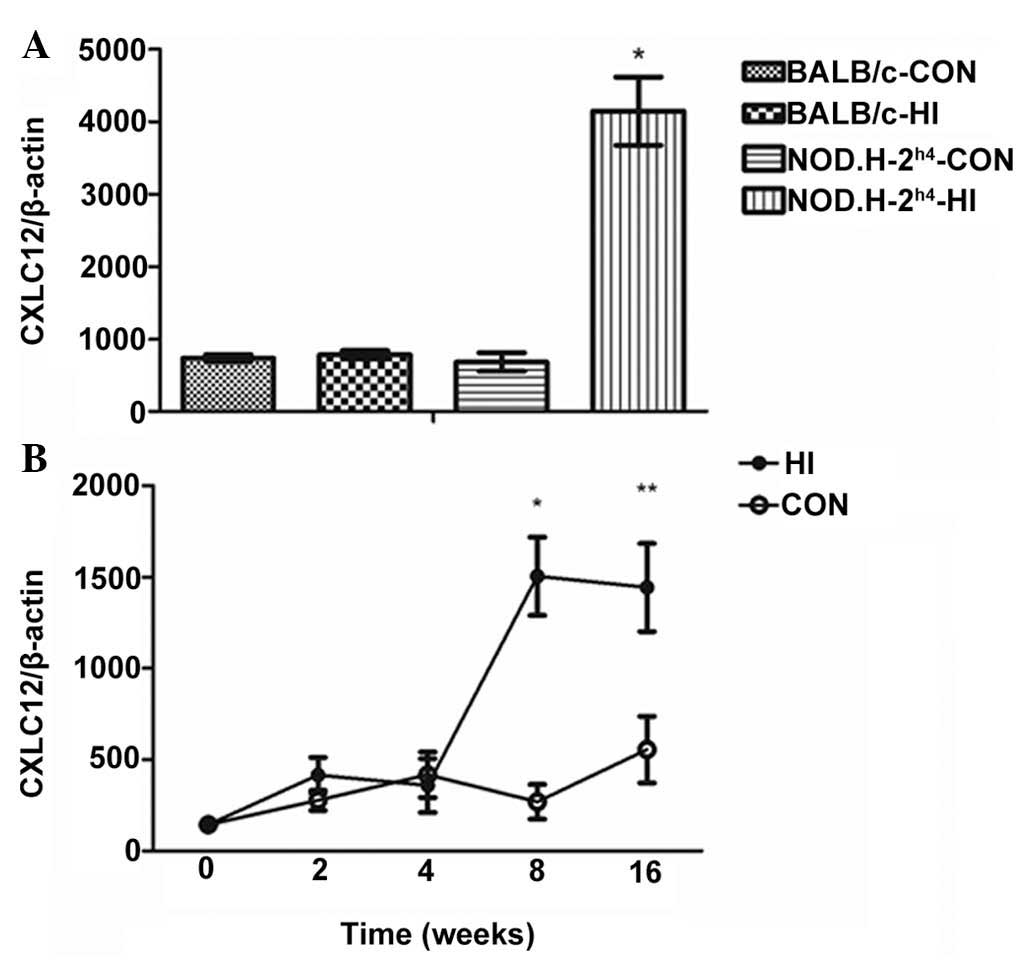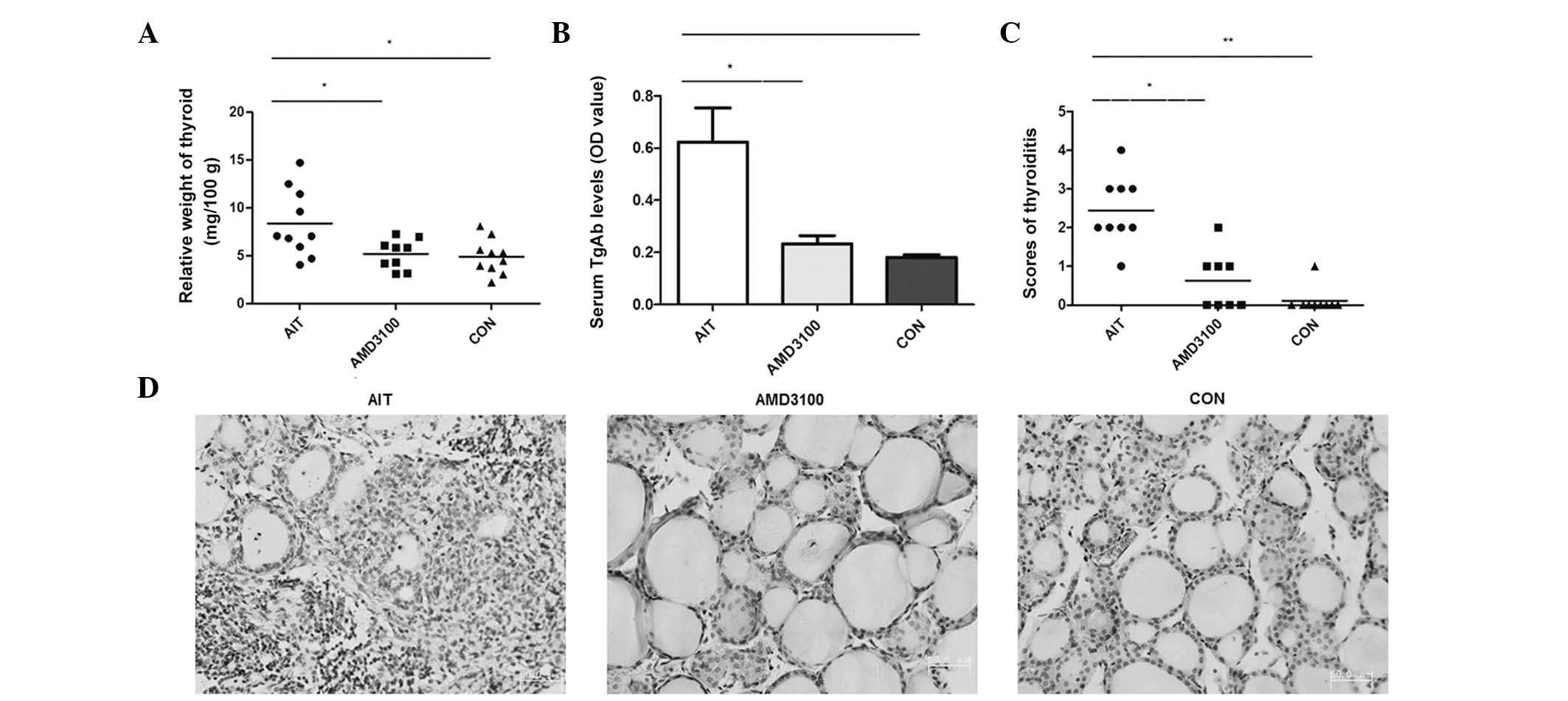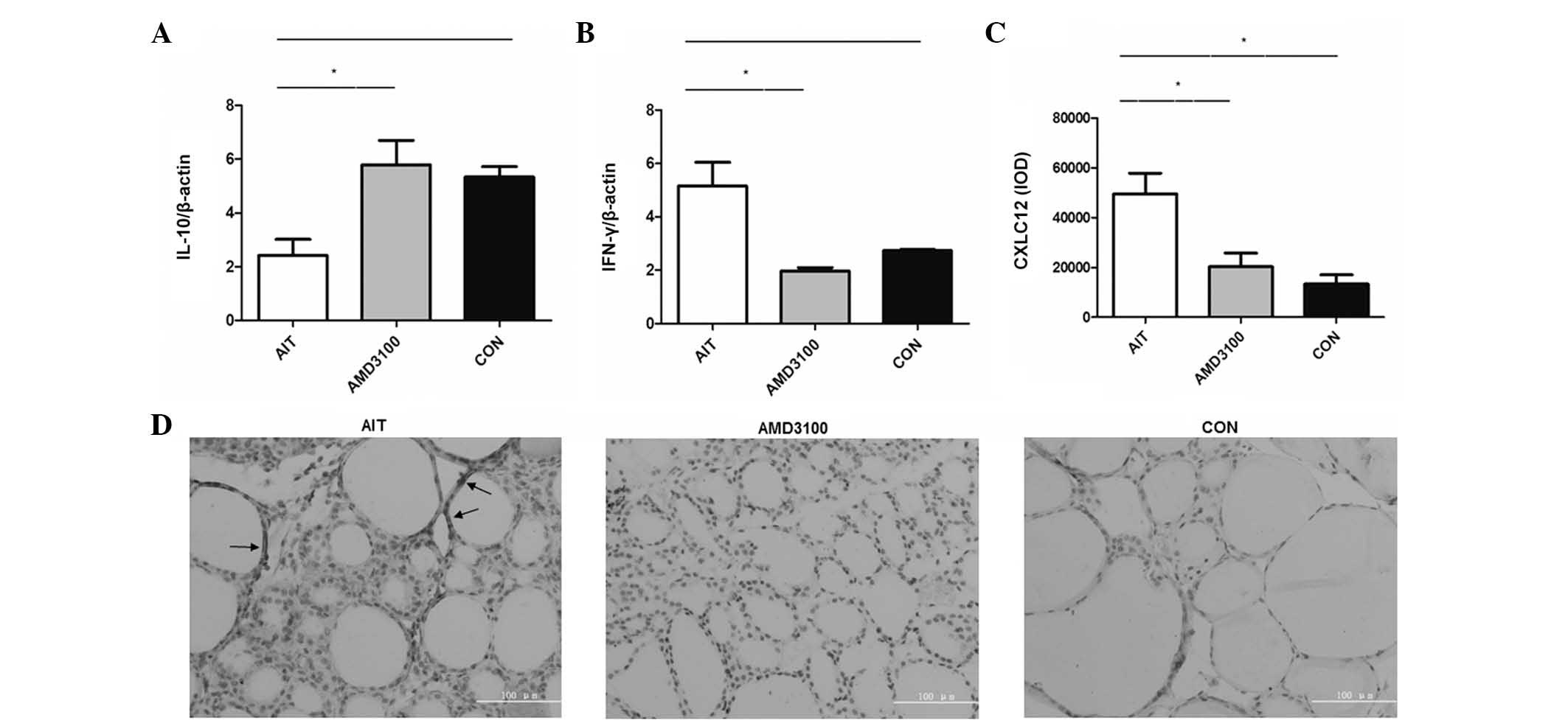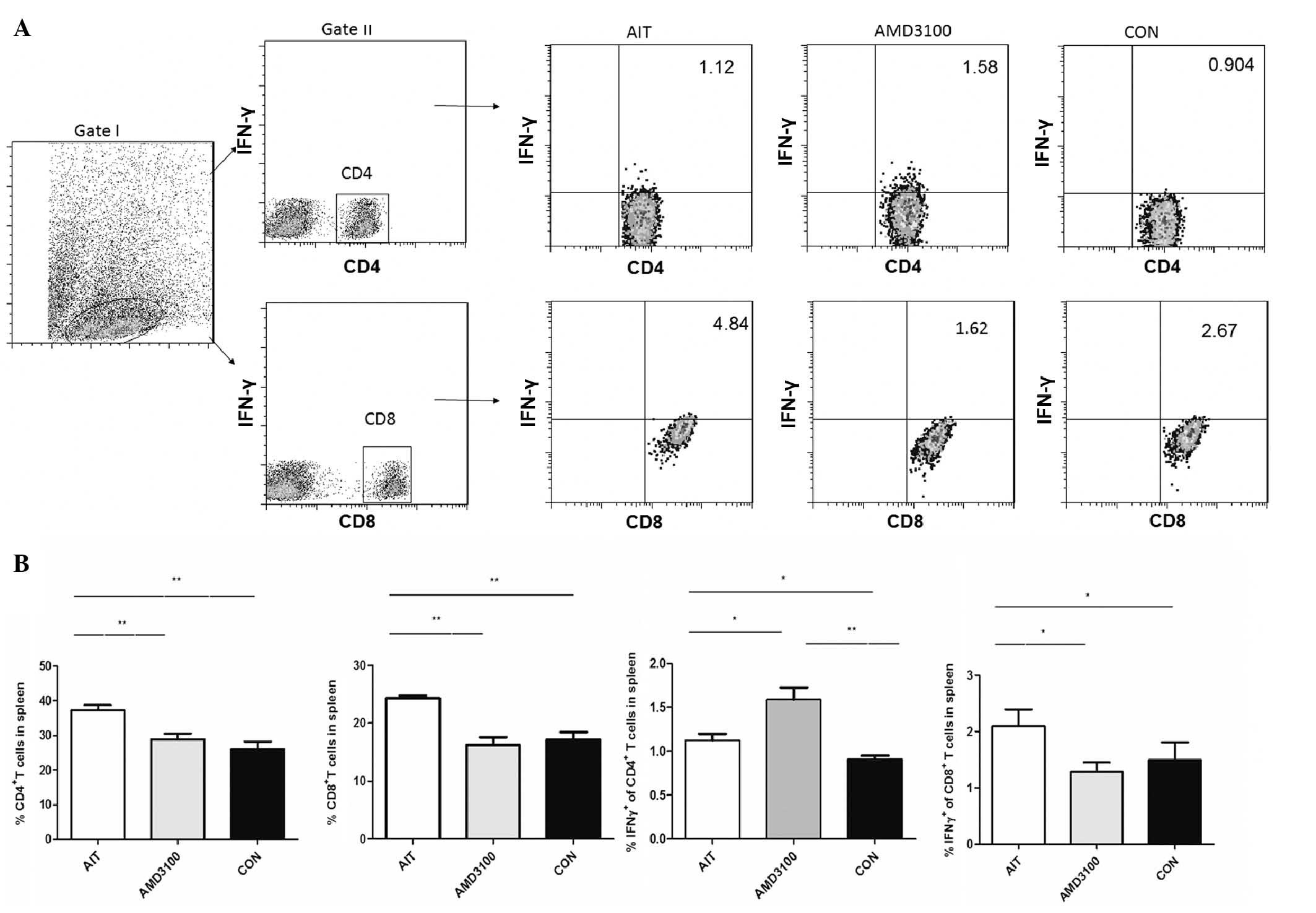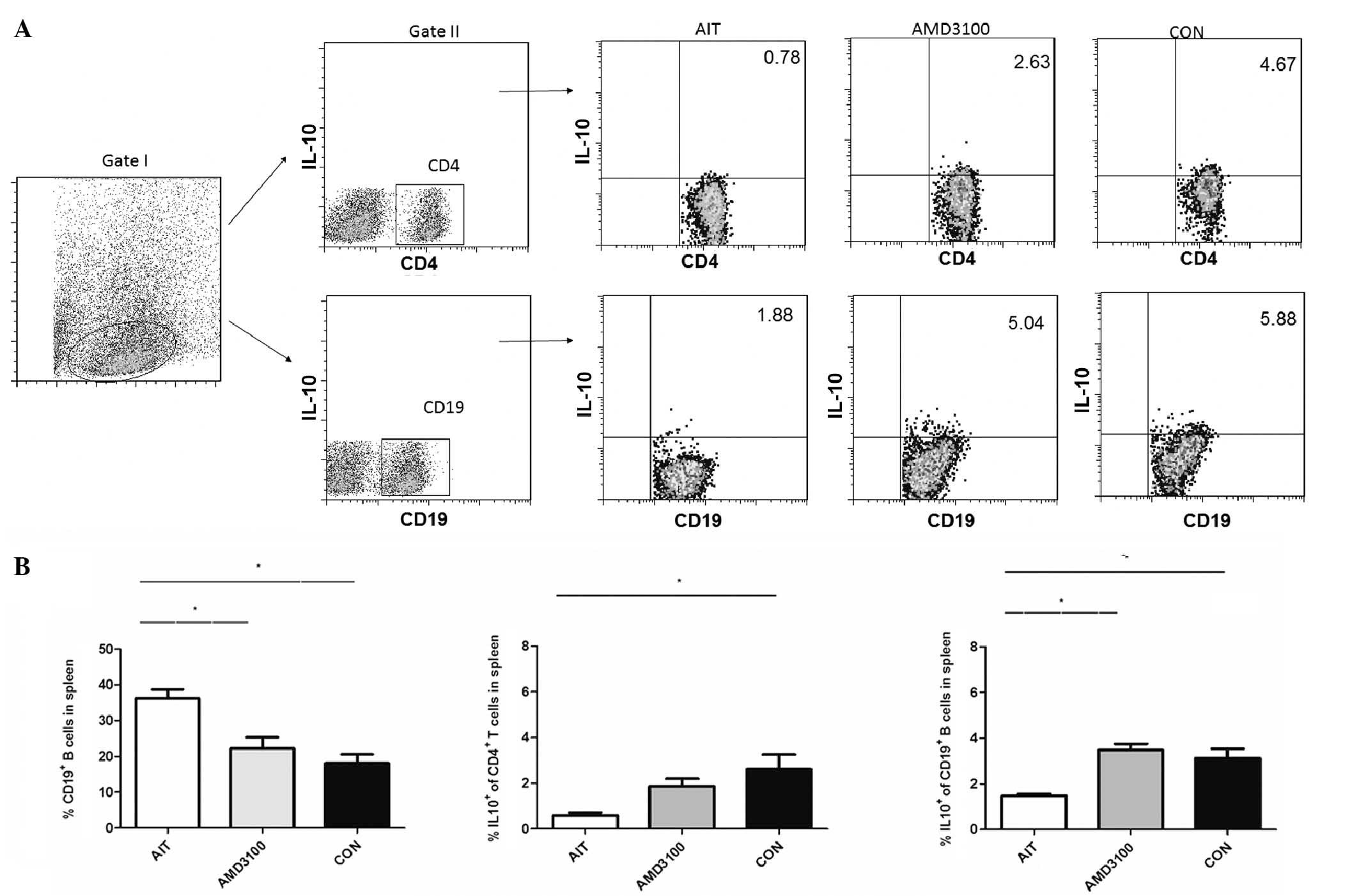|
1
|
Rotondi M, Chiovato L, Romagnani S, Serio
M and Romagnani P: Role of chemokines in endocrine autoimmune
diseases. Endocrine Rev. 28:492–520. 2007. View Article : Google Scholar
|
|
2
|
D'Apuzzo M, Rolink A, Loetscher M, Hoxie
JA, Clark-Lewis I, Melchers F, Baggiolini M and Moser B: The
chemokine SDF-1, stromal cell-derived factor 1, attracts early
stage B cell precursors via the chemokine receptor CXCR4. Eur
Immunol. 27:1788–1793. 1997. View Article : Google Scholar
|
|
3
|
Murdoch C: CXCR4: Chemokine receptor
extraordinaire. Immunol Rev. 177:175–184. 2000. View Article : Google Scholar
|
|
4
|
Momcilović M, Mostarica-Stojković M and
Miljković D: CXCL12 in control of neuroinflammation. Immunol Res.
52:53–63. 2012. View Article : Google Scholar
|
|
5
|
Jinquan T, Quan S, Jacobi HH, Madsen HO,
Glue C, Skov PS, Malling HJ and Poulsen LK: CXC chemokine receptor
4 expression and stromal cell-derived factor-1alpha-induced
chemotaxis in CD4+ T lymphocytes are regulated by interleukin-4 and
interleukin-10. Immunology. 99:402–410. 2000. View Article : Google Scholar : PubMed/NCBI
|
|
6
|
Gupta SK, Lysko PG, Pillarisetti K,
Ohlstein E and Stadel JM: Chemokine receptors in human endothelial
cells. Functional expression of CXCR4 and its transcriptional
regulation by inflammatory cytokines. J Biol Chem. 273:4282–4287.
1998. View Article : Google Scholar : PubMed/NCBI
|
|
7
|
Wang A, Guilpain P, Chong BF, Chouzenoux
S, Guillevin L, Du Y, Zhou XJ, Lin F, Fairhurst AM, Boudreaux C, et
al: Dysregulated expression of CXCR4/CXCL12 in subsets of patients
with systemic lupus erythematosus. Arthritis Rheum. 62:3436–3446.
2010. View Article : Google Scholar : PubMed/NCBI
|
|
8
|
Mikami S, Nakase H, Yamamoto S, Takeda Y,
Yoshino T, Kasahara K, Ueno S, Uza N, Oishi S, Fujii N, et al:
Blockade of CXCL12/CXCR4 axis ameliorates murine experimental
colitis. J Pharmacol Exp Ther. 327:383–392. 2008. View Article : Google Scholar : PubMed/NCBI
|
|
9
|
De Klerck B, Geboes L, Hatse S,
Kelchtermans H, Meyvis Y, Vermeire K, Bridger G, Billiau A, Schols
D and Matthys P: Pro-inflammatory properties of stromal
cell-derived factor-1 (CXCL12) in collagen-induced arthritis.
Arthritis Res Ther. 7:R1208–R1220. 2005. View Article : Google Scholar : PubMed/NCBI
|
|
10
|
Donzella GA, Schols D, Lin SW, Esté JA,
Nagashima KA, Maddon PJ, Allaway GP, Sakmar TP, Henson G, De Clercq
E and Moore JP: AMD3100, a small molecule inhibitor of HIV-1 entry
via the CXCR4 co-receptor. Nat Med. 4:72–77. 1998. View Article : Google Scholar : PubMed/NCBI
|
|
11
|
Leng Q, Nie Y, Zou Y and Chen J: Elevated
CXCL12 expression in the bone marrow of NOD mice is associated with
altered T cell and stem cell trafficking and diabetes development.
BMC Immunol. 9:512008. View Article : Google Scholar : PubMed/NCBI
|
|
12
|
Lukacs NW, Berlin A, Schols D, Skerlj RT
and Bridger GJ: AMD3100, a CxCR4 antagonist, attenuates allergic
lung inflammation and airway hyperreactivity. Am J Pathol.
160:1353–1360. 2002. View Article : Google Scholar : PubMed/NCBI
|
|
13
|
Braley-Mullen H, Sharp GC, Medling B and
Tang H: Spontaneous autoimmune thyroiditis in NOD. H-2h4 mice J
Autoimmun. 12:157–165. 1999. View Article : Google Scholar
|
|
14
|
Charreire J: Immune mechanisms in
autoimmune thyroiditis. Adv Immunol. 46:263–334. 1989. View Article : Google Scholar : PubMed/NCBI
|
|
15
|
Ajjan RA, Watson PF, McIntosh RS and
Weetman AP: Intrathyroidal cytokine gene expression in Hashimoto's
thyroiditis. Clin Exp Immunol. 105:523–528. 1996. View Article : Google Scholar : PubMed/NCBI
|
|
16
|
Roura-Mir C, Catálfamo M, Sospedra M,
Alcalde L, Pujol-Borrell R and Jaraquemada D: Single-cell analysis
of intrathyroidal lymphocytes shows differential cytokine
expression in Hashimoto's and Graves' disease. Eur J Immunol.
27:3290–3302. 1997. View Article : Google Scholar
|
|
17
|
Paschke R, Schuppert F, Taton M and Velu
T: Intrathyroidal cytokine gene expression profiles in autoimmune
thyroiditis. J Endocrinol. 141:309–315. 1994. View Article : Google Scholar : PubMed/NCBI
|
|
18
|
Salzano M, Russo E, Postiglione L, Guerra
A, Marotta V, Esposito S and Vitale M: Interferon-γ inhibits
integrin-mediated adhesion to fibronectin and survival signaling in
thyroid cells. J Endocrinol. 215:439–444. 2012. View Article : Google Scholar : PubMed/NCBI
|
|
19
|
Watson PF, Pickerill AP, Davies R and
Weetman AP: Semi-quantitative analysis of interleukin-1 alpha,
interleukin-6 and interleukin-8 mRNA expression by human
thyrocytes. J Mol Endocrinol. 15:11–21. 1995. View Article : Google Scholar : PubMed/NCBI
|
|
20
|
Garcia-Lopez MA, Sancho D, Sanchez-Madrid
F and Marazuela M: Thyrocytes from autoimmune thyroid disorders
produce the chemokines IP-10 and Mig and attract CXCR3+
lymphocytes. J Clin Endocrinol Metab. 86:5008–5016. 2001.
View Article : Google Scholar : PubMed/NCBI
|
|
21
|
Goulvestre C, Batteux F and Charreire J:
Chemokines modulate experimental autoimmune thyroiditis through
attraction of autoreactive or regulatory T cells. Eur J Immunol.
32:3435–3442. 2002. View Article : Google Scholar : PubMed/NCBI
|
|
22
|
Antonelli A, Ferri C, Fallahi P, Ferrari
SM, Frascerra S, Carpi A, Nicolini A and Ferrannini E:
Alpha-chemokine CXCL10 and beta-chemokine CCL2 serum levels in
patients with hepatitis C-associated cryoglobulinemia in the
presence or absence of autoimmune thyroiditis. Metabolism.
57:1270–1277. 2008. View Article : Google Scholar : PubMed/NCBI
|
|
23
|
Campbell JJ and Butcher EC: Chemokines in
tissue-specific and microenvironment-specific lymphocyte homing.
Curr Opin Immunol. 12:336–341. 2000. View Article : Google Scholar : PubMed/NCBI
|
|
24
|
Armengol MP, Cardoso-Schmidt CB, Fernández
M, Ferrer X, Pujol-Borrell R and Juan M: Chemokines determine local
lymphoneogenesis and a reduction of circulating CXCR4+ T and CCR7 B
and T lymphocytes in thyroid autoimmune diseases. J Immunol.
170:6320–6328. 2003. View Article : Google Scholar : PubMed/NCBI
|
|
25
|
National Research Council (US) Committee
for the Update of the Guide for the Care and Use of Laboratory
Animals: Guide for the Care and Use of Laboratory Animals. 8th
edition. Washington (DC): National Academies Press (US); 2011
|
|
26
|
Xue H, Wang W, Shan Z, Li Y, Li Y, Teng X,
Gao Y, Fan C and Teng W: Dynamic changes of CD4+CD25+ regulatory T
cells in NOD.H-2h4 mice with iodine-induced autoimmune thyroiditis.
Biol Trace Elem Res. 143:292–301. 2011. View Article : Google Scholar
|
|
27
|
Teng X, Shan Z, Teng W, Fan C, Wang H and
Guo R: Experimental study on the effects of chronic iodine excess
on thyroid function, structure and autoimmunity in autoimmune-prone
NOD.H-2h4 mice. Clin Exp Med. 9:51–59. 2009. View Article : Google Scholar
|
|
28
|
Imaizumi M, Pritsker A, Kita M, Ahmad L,
Unger P and Davies T: Pregnancy and murine thyroiditis:
Thyroglobulin immunization leads to fetal loss in specific
allogeneic pregnancies. Endocrinology. 142:823–829. 2001.PubMed/NCBI
|
|
29
|
Zhang L, Teng W, Liu Y, Li J, Mao J, Fan
C, Wang H, Zhang H and Shan Z: Effect of maternal excessive iodine
intake on neurodevelopment and cognitive function in rat offspring.
BMC Neurosci. 13:1212012. View Article : Google Scholar : PubMed/NCBI
|
|
30
|
Xia XM, Wang FY, Xu WA, Wang ZK, Liu J, Lu
YK, Jin XX, Lu H and Shen YZ: CXCR4 antagonist AMD3100 attenuates
colonic damage in mice with experimental colitis. World J
Gastroenterol. 16:2873–2880. 2010. View Article : Google Scholar : PubMed/NCBI
|
|
31
|
Matthys P, Hatse S, Vermeire K, Wuyts A,
Bridger G, Henson GW, De Clercq E, Billiau A and Schols D: AMD3100,
a potent and specific antagonist of the stromal cell-derived
factor-1 chemokine receptor CXCR4, inhibits autoimmune joint
inflammation in IFN-gamma receptor-deficient mice. J Immunol.
167:4686–4692. 2001. View Article : Google Scholar : PubMed/NCBI
|
|
32
|
Hutchings PR, Verma S, Phillips JM, Harach
SZ, Howlett S and Cooke A: Both CD4(+) T cells and CD8(+) T cells
are required for iodine accelerated thyroiditis in NOD mice. Cell
Immunol. 192:113–121. 1999. View Article : Google Scholar : PubMed/NCBI
|
|
33
|
Grant AJ, Goddard S, Ahmed-Choudhury J,
Reynolds G, Jackson DG, Briskin M, Wu L, Hübscher SG and Adams DH:
Hepatic expression of secondary lymphoid chemokine (CCL21) promotes
the development of portal-associated lymphoid tissue in chronic
inflammatory liver disease. Am J Pathol. 160:1445–1455. 2002.
View Article : Google Scholar : PubMed/NCBI
|
|
34
|
Yu S, Medling B, Yagita H and
Braley-Mullen H: Characteristics of inflammatory cells in
spontaneous autoimmune thyroiditis of NOD.H-2h4 mice. J Autoimmun.
16:37–46. 2001. View Article : Google Scholar : PubMed/NCBI
|
|
35
|
Ganesh BB, Bhattacharya P, Gopisetty A and
Prabhakar BS: Role of cytokines in the pathogenesis and suppression
of thyroid autoimmunity. J Interferon Cytokine Res. 31:721–731.
2011. View Article : Google Scholar : PubMed/NCBI
|
|
36
|
Trinchieri G: Regulatory role of T cells
producing both interferon gamma and interleukin 10 in persistent
infection. J Exp Med. 194:F53–F57. 2001. View Article : Google Scholar : PubMed/NCBI
|
|
37
|
Shi L, Bi M, Yang R, Zhou J, Zhao S, Fan
C, Shan Z, Li Y and Teng W: Defective expression of regulatory B
cells in iodine-induced autoimmune thyroiditis in non-obese
diabetic H-2(h4) mice. J Endocrinol Invest. 37:43–50. 2014.
View Article : Google Scholar : PubMed/NCBI
|
|
38
|
Fang Y, Yu S and Braley-Mullen H:
Contrasting roles of IFN-gamma in murine models of autoimmune
thyroid diseases. Thyroid. 17:989–994. 2007. View Article : Google Scholar : PubMed/NCBI
|
|
39
|
Annunziato F, Cosmi L, Galli G, Beltrame
C, Romagnani P, Manetti R, Romagnani S and Maggi E: Assessment of
chemokine receptor expression by human Th1 and Th2 cells in vitro
and in vivo. J Leukoc Biol. 65:691–699. 1999.PubMed/NCBI
|
|
40
|
De Clercq E: The bicyclam AMD3100 story.
Nat Rev Drug Discov. 2:581–587. 2003. View Article : Google Scholar : PubMed/NCBI
|
|
41
|
Fricker SP, Anastassov V, Cox J, Darkes
MC, Grujic O, Idzan SR, Labrecque J, Lau G, Mosi RM, Nelson KL, et
al: Characterization of the molecular pharmacology of AMD3100: A
specific antagonist of the G-protein coupled chemokine receptor,
CXCR4. Biochem Pharmacol. 72:588–596. 2006. View Article : Google Scholar : PubMed/NCBI
|
|
42
|
Momcilović M, Mostarica-Stojković M and
Miljković D: CXCL12 in control of neuroinflammation. Immunol Res.
52:53–63. 2012. View Article : Google Scholar
|
|
43
|
Aboumrad E, Madec AM and Thivolet C: The
CXCR4/CXCL12 (SDF-1) signalling pathway protects non-obese diabetic
mouse from autoimmune diabetes. Clin Exp Immunol. 148:432–439.
2007. View Article : Google Scholar : PubMed/NCBI
|
|
44
|
Brunn A, Utermöhlen O, Mihelcic M,
Sánchez-Ruiz M, Carstov M, Blau T, Ustinova I, Penfold M,
Montesinos-Rongen M and Deckert M: Differential effects of
CXCR4-CXCL12- and CXCR7-CXCL12-mediated immune reactions on murine
P0106-125-induced experimental autoimmune neuritis. Neuropathol
Appl Neurobiol. 39:772–787. 2013. View Article : Google Scholar : PubMed/NCBI
|















